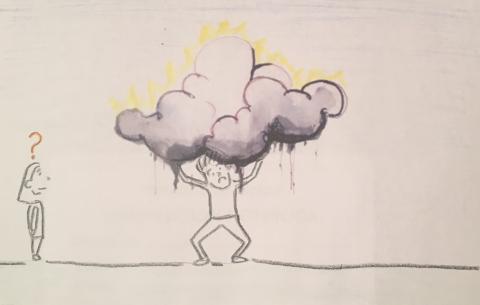February 16, 2016 - 00:08

“It’s not a matter of the right choice of the wrong choice, but simply that we are often presented with a dilemma about bringing together the inspirations of the teachings with what they mean to us on the spot. There is a perplexing tension between our aspirations and the reality of feeling tired, hungry, stressed-out, afraid, bored, angry, or whatever we experience in any given moment in our life” – Pema Chodron, “Three Methods for Working with Chaos”
I’ve been thinking a lot lately about the guilt that circulates around communities of activists—the constant feeling of never doing “enough,” whatever “enough” really means—and the toxic comparison of how much people are doing to help out their community and others. Even within groups whose work seeks to challenge the dangerous and impossible norms set forth by society, there is so often an image of the ideal activist, the one who wants to help and does help more constantly and effectively, even and especially at the expense of their own comfort. I struggle to find myself in this image, and so frequently doubt my intentions as I work among marginalized populations through placements and internships. What does it say about me, about my essential goodness or lack thereof, if I don’t always look forward to going to my placement? If I feel sometimes that I would rather stay in bed than go to Haverford to work in the lab with participants from the center? I am so quick to question my whole purpose when I don’t feel a constant, overwhelming drive to be there.
But I realize as I read Chodron’s words that part of not seeing myself as a “helper” or “savior” is recognizing my own humanity, my own imperfections. I simply can’t put myself on a pedestal as I enter communities if I honor and work with my more “selfish” inclinations for rest or personal time—understanding where they come from, and through this recognition of imperfection, connecting on a person-to-person basis with community members.


Comments
Reply
Submitted by Gabriela Lomba (not verified) on February 16, 2016 - 11:45 Permalink
I really enjoyed your reflection. I often find myself in a similar position; it is easy to be overwhelmed with contradicting feelings and guilt. I think you answer your own conundrum quite eloquently with Pema Chodron's reading. Chodron also writes the following: "Regarding whatever arises as awakened energy." I think this could also apply. This tiredness, stress, or apathy shouldn't be dismissed. I think connecting with these feeling helps us better understand why they are happening and how they affect us.
Your response also got me thinking about "The Art of Being a Healing Presence." Especially when you write, "But I realize as I read Chodron’s words that part of not seeing myself as a “helper” or “savior” is recognizing my own humanity, my own imperfections. I simply can’t put myself on a pedestal as I enter communities if I honor and work with my more “selfish” inclinations for rest or personal time—understanding where they come from, and through this recognition of imperfection, connecting on a person-to-person basis with community members." I think this ties in with Miller's notion of taking care of yourself simultaneously while being a healing presence for others.
The "moment"
Submitted by jzhou on February 16, 2016 - 11:57 Permalink
I felt really resonated with the idea that we all had moments of conflcit between aspirations and reality of feeling stressed-out. I had similar emotional experiences of struggling. Some research also pointed out that the feeling of guit is constructive and can be a motivation to improve ourselves. However, this "guilt-centered" approach may orient us towards perfection and self-blaming, which confine us in stringent rules and standards.